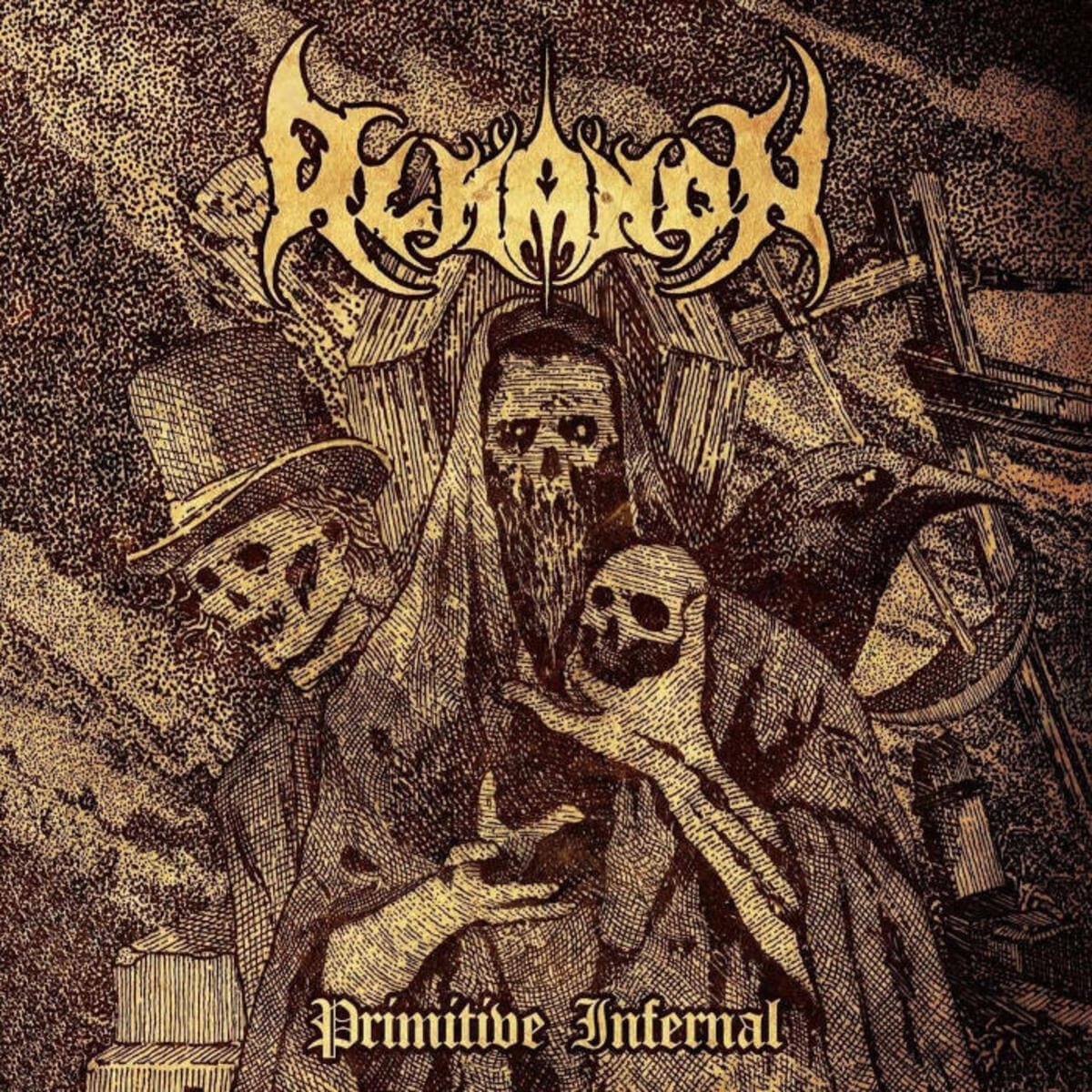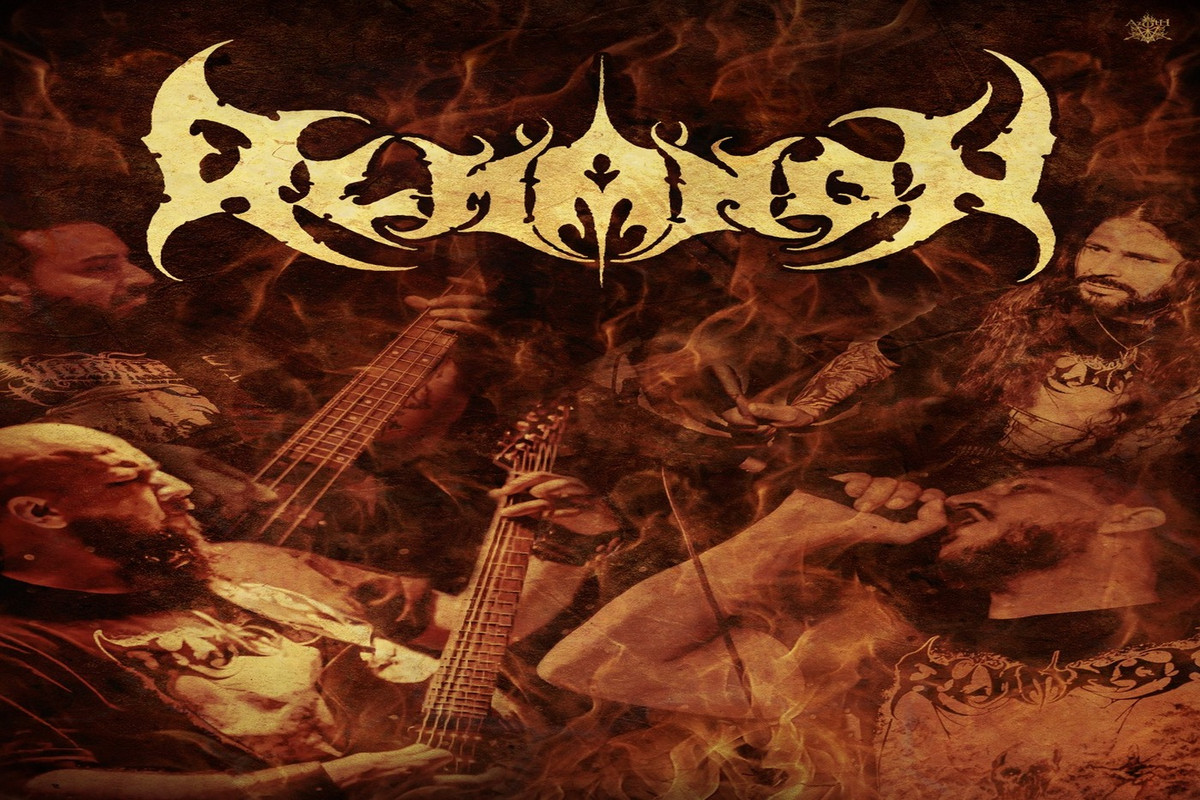Almanon — Primitive Infernal Review
From the scorched soil of Brazil’s underground, Almanon emerges cloaked in ritual decay. Primitive Infernal, their debut full-length—is no mere album, but a ceremonial descent. Released independently on July 13th, 2025, this Death-Black liturgy channels the poetic grandeur of Edgar Allan Poe, transfiguring dread into hymn.
Almanon, Primitive Infernal Review: This review will evaluate every aspect of the album, from its intricate musical composition to its production. Our analysis will provide valuable insights to help you determine if this album is worth adding to your collection.

The First Three Sins, The Summary
The Fourth Sin, Overall Discussion
The Suffocation Begins: A Hymn to Premature Burial
The moment the play button is pressed, the self-titled overture, Primitive Infernal, descends. The hymn immediately immerses the listener in a chilling, gothic atmosphere.
This initial hymn captures perfectly the primal fear of being interred alive. Its ambient soundscape evokes suffocation. The feeling is deeply ceremonial. It’s a descent into utter dread.
A ceremonial tone is established. This is the prelude to the darkness that awaits.
Eight Hymns of Infernal Conjuration: Poe’s Gothic Transfigured
Following suit this oppressive theme and morbid procession, are the remaining eight hymns and one’s journey. Across its thirty-six-minute duration, the album functions as a ritual torment. It’s a journey through despair, and infernal conjuration. Almanon‘s sonic foundation is rooted in the bleak atmosphere of black metal, infused with the guttural brutality of death metal. Yet beneath this ferocity lies a pervasive undercurrent of doom metal—It’s crushing weight and mournful grandeur saturate the soundscape.
This isn’t a fleeting touch; it’s a ritual presence. Their mid-tempo pacing often feels like a crawl through ash, allowing immense, suffocating riffs to breathe, rot, and decay. Picture the icy shriek of black metal vocals collapsing into vast, echoing lamentations, or the relentless speed of death metal ruptured by moments of existential dread. Doom’s influence doesn’t dilute—it deepens, adding tragic resonance and ceremonial gravity.
“Almanon doesn’t merely blend genres—they conjure a sonic tapestry of Midnight Dreary—where sorrow coils, riffs decay, and grandeur mourns.”
Simultaneously, although the lyrical themes transform through Poe’s gothic perspective, the primary lyrics explore death, war, and anti-religion—eight hymns derived from seven of Poe’s short stories.
Consider hymns like “Death Red.” It’s a torrent of blood-soaked guitar riffs. The pacing is intentionally ritualistic. Then there’s “Tormented by Agony.” This six-minute piece plunges into raw anguish. Layered growls weave with atmospheric dread. “Human Perversity” offers a brutal, savage reflection on depravity. It’s short, sharp, and unforgiving.
Smoke in the Temple: Lo-Fi Devotion and Ritual Purity
As the listener progresses through the music, it feels like Almanon conjures a sound that is raw and unrepentant and steeped in underground ethos. The atmosphere is thick, almost oppressive—like smoke curling through a desecrated temple. The lo-fi production actively enhances the infernal mood, avoiding any eschewing of studio polish.
Released independently, limited to just 300 digipaks. As mentioned, the production’s intentional rawness, it’s not clean; it’s ritual purity over slick studio sound. Almanon‘s mix is cavernous; the vocals are buried just enough to sound like distant incantations. Guitars dominate the sonic void, drums thunder like a raven’s call. The bass coils beneath it all, a venomous serpent.
Bone Against Stone: Guitar as Ceremonial Blade
Almanon delivers its dark vision with a devilmanship that’s floored to perfection. The compositions and instrumental score are flawless and fruit of art–of-dread. Sérgio Vieira’s guitar work is particularly noteworthy. His tone is scorched and serrated. The riffs are primal and visceral. They often feature tremolo-picked riffs with blackened urgency, but occasionally slow to a death-doom crawl. There’s no melodic respite to be found. It’s purely ritualistic abrasion — imagine bone scraping against stone.
Hymns such as “Death Red” and “Pendulum” highlight this duality. They showcase speed and despair, fire and ash in equal measure.
At moments, Almanon’s scorched guitar riffs echo the spectral cadence of Rotting Christ’s ‘The Raven.’ This is no mimicry, but a shared invocation. Both artists channel a ritualistic tremolo picking. It feels less like melody and more like an ancient chant. It’s the sound of ash swirling in a crypt. Furthermore, it’s the sound of minor-key dissonance carved into stone. “Bringing Poe’s work to alive”

The Serpent Coil and the War Drum: Bass and Percussion as Ritual Pulse
Gustavo Jianoto’s bass is subterranean—felt more than heard. It avoids the spotlight, anchoring the ritual’s foundation. In Tormented by Agony, it pulses like a dying heart, giving weight to the anguish. It embodies the serpent coil motif: It embodies the serpent coil motif — hidden, venomous, and utterly essential.
Ricky Longinus’ drumming is thunderous and tribal. Blast beats erupt like volcanic curses, while slower passages feel ceremonial, almost funereal in their delivery. The snare is sharp and cracking. Cymbals hiss like escaping steam. Toms roll like distant war drums. Horses Infernal Flames exemplifies perfectly this dynamic shift. It swings between furious assault and ritualistic pacing.
Voice from the Crypt: Invocation Through Tormented Utterance
Paulo Lopes’ vocals are a disturbing tapestry of layered growls and shrieks. They function more as invocation than mere narration. They echo through the mix like a disembodied voice from the crypt. There is no attempt at clear enunciation. Clarity is absent, replaced by tormented utterance. This is particularly evident in tracks like Human Perversity and Despair. It’s the unsettling sound of a soul systematically unravelling.
Tombs of Sound: Poe’s Dread Ritualised in Hymnal Form
Each hymn on Primitive Infernal exhumes a tale from Edgar Allan Poe, transfigured into sonic ritual. The opening invocation, “Primitive Infernal,” draws from The Premature Burial, where catalepsy becomes suffocation and silence. “The Black Birds” channels The Raven, shrieking grief into tremolo prophecy, while “Shadows” crumbles like The Fall of the House of Usher, its riffs echoing ancestral collapse. “Horses Infernal Flames” gallops through Metzengerstein, cursed and aflame. At the centre swings “Tormented by Agony,” a six-minute descent into the horror of waking within the grave—cataleptic torment rendered in rhythm and ash. “Death Red” dances through The Masque of the Red Death, blood-soaked and regal, while “Human Perversity” claws at conscience in the spirit of The Black Cat. The final lament, “Despair,” pulses with guilt and madness, echoing The Tell-Tale Heart, and the final hymn, “Pendulum,” returns to the blade’s arc—closing the ritual with hypnotic pacing and the dread of time itself becoming torment.
“These are not songs—they are tombs. Poe’s dread is not referenced. It is ritualised”.
In summation, Almanon’s “Primitive Infernal” stands as a dark, fruit-of-art achievement. It is slow, steeped in despair, and utterly steeped in horror and E.A. Poe’s gothic literature.
Echoes in Shadow, Midnight Dreary: The Ritual Closes, Yet Lingers
As Death is The Hammer fades into its final echoes, we extend our deepest thanks to Cutting Edge Metal PR for granting us the honour of reviewing Necrokinesis‘ Death is the Hammer. Now, we descend into the final triad of sins—each a closing invocation in this thrash-death ceremony. What follows is not merely a conclusion, but a reckoning.
The Fifth Sin, The Memorabilia
For me, Almanon‘s Primitive Infernal offered not just a powerful and dark fruit of art, but something deeper—an infusion of lyrical spirit drawn from the works of Edgar Allan Poe. Rather than echoing the more common mythic tones of Tolkien or Lovecraft—writers I deeply admire—Almanon channels a different kind of literary darkness. Each song stands on its own, yet together they merge into a singular hymn, like reading a novel composed of infernal chapters.
What truly brings these tracks to life are the intros on songs two, three, and four—cinematic sound effects that act as ritual gateways, awakening the narrative within? The devilmanship, the composition, the atmosphere—it’s all fruit of art.
The Sixth Sin, The Artwork
Three skeletal figures, cloaked and crowned, cradle death like a relic. A raven watches. A cross looms. The gold-on-brown palette evokes ancient parchment, as if this album were unearthed from a tomb. Captures the whole lyrical concept.
The Seventh Sin, Disrelish
To misunderstand Primitive Infernal is to miss the point entirely. There is no disrelish here—only devotion. Every note is deliberate. Every passage, a testament to flawed brilliance. This is ritual failure made sacred. Thus, we conclude our review of Primitive Infernal. I would like to take this opportunity to express my gratitude for your time in reading this article, and I encourage you to explore the work of Almanon.
Before sealing the chamber door, we invite readers to step beyond the music and into the mind behind Almanon‘s Primitive Infernal. Each utterance is a lament, tapping from behind the chamber door—words that bleed like ink from a cursed quill, each line a hymn to premature burial. Read the full interview and descend deeper into a crypt-bound manuscript.
The Hymns
01. Primitive Infernal
02. The Black Birds
03. Shadows
04. Horses Infernal Flames
05. Dead Red
06. Tormented by Agony
07. Human Perversity
08. Despair
09. Pendulum
Almanon
Gustavo Jianoto — Bass
Ricky Longinus — Drums(2020-20205
Sérgio Vieira — Guitars
Paulo Lopes — Vocals